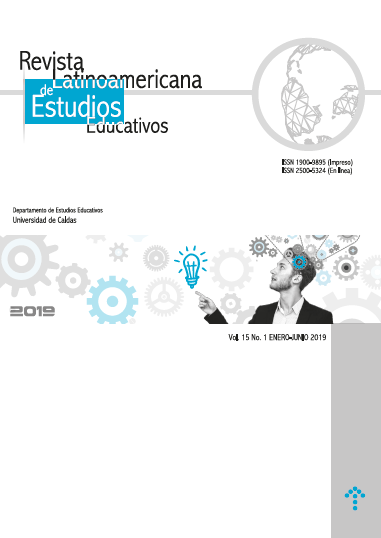Authors
Abstract
This paper presents the results of a documentary research on the work of the French pedagogue Fernand Deligny. The work addresses his particular pedagogy from the perspective of the maps (very relevant in the whole of his work) and the body (one of the privileged forms of communication in subjects in vulnerable situations). From the perspective of the body-cartography a critical route through his biography around the educational ideas of his nomadic pedagogy, as well as through the idea of the network like privileged relational form is offered. The work presents the question of the minimum gesture as one of the privileged ways of exercising pedagogy in the educational actions of Deligny.
Keywords
References
Bastide, B. (2004). Correspondance François Truffaut- Fernand Deligny, 1895. Millehuit cent quatre-vingt-quinze, 42, 1-20.
Chauvière, M. (2007). Devenir Deligny (1938-1948), en Fernand Deligny, Oeuvres. París: L’Arachneen, pp., 369-377.
Deligny, F. (1971). Los vagabundos eficaces. Barcelona: Estela.
Deligny, F. (1975). Nous et l’Innocent. París: Maspero.
Deligny, F. (1977). Nous et l’innocent. París: Maspero.
Deligny, F. (2007). Oeuvres. París: L’Arachneen.
Deligny, F. (2008). Permitir, trazar, ver. Barcelona: MACBA.
Deligny, F. (2013). Carte et lignes d’erre / Maps and Wander Lines. Traces du réseau de Fernand Deligny 1969-1979. París: Éditions l’Arachnéen.
Deligny, F. (2015). Lo arácnido y otros textos. Buenos Aires: Editorial Cactus.
Deligny, F. (1977). Adrien Lomme. Collection Blanche, Gallimard.
Deleuze, G. y Guattari, F. (2004). Mil mesetas. Pre-textos, 2004.
Dolphijn, R. and Van Der Tuin, I. (2012). New Materialism: Interviews & Cartographies. Michigan: Open Humanities. doi: 10.3998/ohp.11515701.0001.001
Goffman, E. (1970). Internados. Ensayos sobre la situación social de los enfermos mentales. Buenos Aires: Amorrortu.
Gómez, J-F. (1994). L’éducateur et son autre histoire ou Mort d’un pédagogue. Ginebra: Éditions des deus continents.
Grelley, P. (2009). Fernand Deligny (1913-1996): le travail social au coeur, Informations Sociales, 152, 135.
Han Kia-Ki, B. (2003). Fernand Deligny: esquive, dérive et tentatives d’éducation, Le Télémaque, 23, 117-132.
Houssaye, J. (1998). Deligny, éducateur de l’extrême. Toulouse: Érès.
Jeanne, Y. (2006). Fernand Deligny: Libeté et compagnonnage, Reliance, 21, 113-118.
Krüger, H-H. (2012). La hermenéutica científico-espiritual. En: Introducción a las teorías y métodos de la ciencia de la educación (Trad. de Andrés Klaus Runge). Opladen: Leske y Budrich.
Mafessoli, M. (2004). El tiempo de las tribus. México DF: FCE.
Moshnyager, N. (2014). Fernand Deligny. Carte et lignes d’erre / Maps and Wander Lines. Traces du réseau de Fernand Deligny 1969-1979 et Journal de Janmari, Essaim, 33, 157-166.
Pinardi, S. (2016). En torno a Deligny: las líneas de errancia como esbozo de un límite animal de la imagen. Voz y Escritura. Revista de estudios literarios, 24, 16-31.
Planella, J. (2012). Pedagogía y nomadismo en la educación de las otras infancias, Educació i Història, 20, 95-115.
Planella, J. (2015). Fernand Deligny o la tentativa de una pedagogía surgida en el limbo, en introducción a Fernand Deligny, Los Vagabundos Eficaces. Barcelona: Ediuoc, pp. 9-41,
Poisson-cogez, N. (2012). lignes d’erre. Les cartes de Fernand Deligny, LNA#60 / l’art et la manière. Recuperado de http://culture.univ-lille1.fr/fileadmin/lna/lna60/lna60p34.pdf. (Fecha de consulta, 10/10/2015).
Ribordy-Tschopp, F. (1989). Fernand Deligny, éducateur sans qualités. Ginebra: IES.
Van Heerden, C. (2017). The slightest gesture: Deligny, the ritornello and subjectivity in socially just pedagogical praxis. Education as Change, vol. 21 | N° 2 pp. 6–24.
Wiame, A. (2016). Reading Deleuze and Guattari through Deligny’s Theatres of Subjectivity: Mapping, Thinking, Performing. Subjectivity, 9 (1), pp. 38-58. https://doi.org/10.1057/sub.2015.18

 PDF (Español)
PDF (Español)
 FLIP
FLIP























